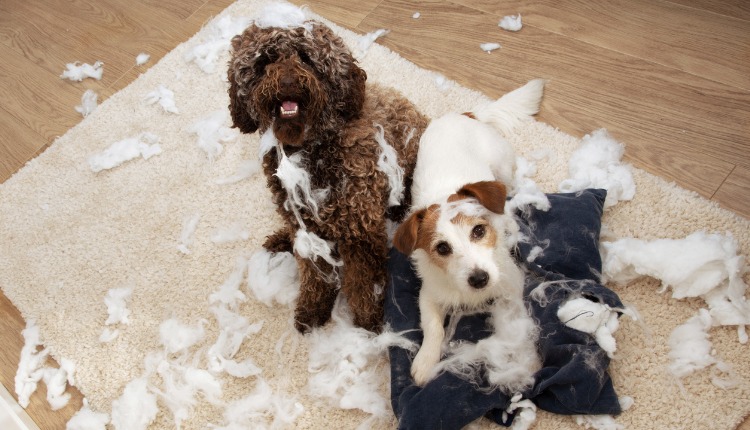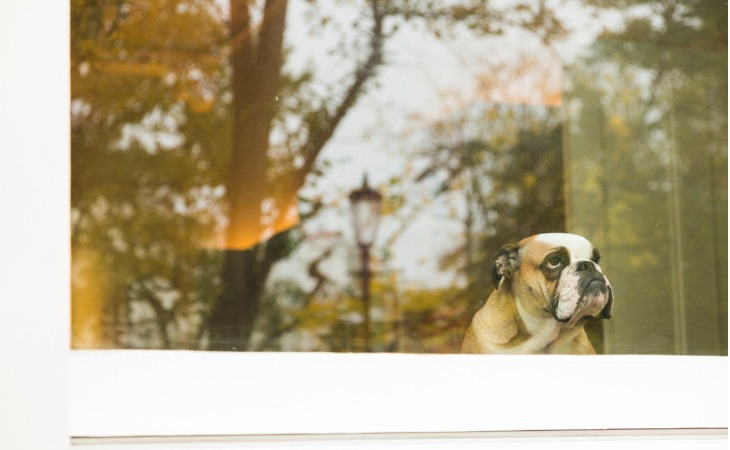Does your dog whine as soon as you are no longer in their field of vision? Do they destroy your belongings when you’re gone? If so, your dog is probably suffering from what dog behaviorists call separation anxiety. This behavioral disorder manifests itself through clearly visible signals, but its cause is sometimes complicated to identify. We’ll help you understand the cause of your dog’s anxiety and what you can do to help them.
Recognizing separation anxiety in dogs
Separation anxiety manifests itself in many ways depending on your dog’s personality. Here are a few symptoms that show that your dog might have separation anxiety.
Unusual behavior in your absence
Does it look like a hurricane went through your house when you return home? This destructive behavior is one of the most common symptoms of separation anxiety in dogs. When you’re away, your dog seeks you out. To channel their distress, they tend to go after things that remind them of their owner. Anything that has your scent on it, like clothes and shoes, could get ruined by your dog.
Dog can also express their distress through whining. These sounds are used to call you, as they would call their mother. It is useless to scold your dog when they do this. In fact, it could make the situation worse. Punishment is just as counterproductive.
Your dog is particularly clingy
Is your dog is constantly seeking your attention? Are they always asking to be petted for hours on end? Your dog doesn’t have to be away from you for long hours to feel anxious. Sometimes, just a momentary absence is enough to cause separation anxiety in dogs. It could be because they have a fear of abandonment or because of a past trauma.
Overly affectionate behavior may seem cute at first, but this constant need to be by your side is not normal. It’s especially worrisome when your dog stops eating their meal or napping to follow you around. This hyper-attachment is a hindrance to your dog’s natural need for independence.

What causes separation anxiety in dogs?
Your dog’s anxiety can have many causes, whether it be because they get too much attention on a daily basis or because they develop bad habits that lead to emotional dependence.
Too much attention
From the time they are born, dogs form strong attachements with their environment. First, they are dependent on their mother, then on the members of their home. This close bond is essential for their well-being. In order to become more autonomous, they must learn to detach themselves gradually. That’s why their mothers gradually push them away.
Many owners deviate from this pattern by giving their dog too much attention. Dogs need firmness to grow and find their rightful place. Although you may mean well, certain habits such as letting your dog sleep in your bed, may cause your dog to become more dependent. If they are too dependent on you, your dog will be confused when you leave them.
Routines when leaving the house
To help your dog cope with separation anxiety, it is tempting to establish habits when leaving the house. Some owners will try to reassure their dog by talking to them gently, while others will try to explain that they will not be gone for long.
Your dog’s anxiety increases as they realize that you are about to leave. Waving your keys and putting on your coat signals to your dog that you are leaving and can start to stress your dog. They may show anxiety through physical signs such as excessive salivation or uncontrolled shaking.
What can I do to help cure my dog’s separation anxiety?
Learn to ignore your dog
Responding to your dog’s every request is the surest way to make your dog more dependent on you. Do you rush to your dog as soon as they bark or whine? It is up to you, the owner, to not follow their every demand. Of course, it is not necessary to reject your dog all the time. Just try to ignore your dog from time to time.
In addition, do not reprimand your dog as soon as you return home. Keep in mind that your dog is aware of the present moment and may not remember what happened minutes or hours earlier. If you get frustrated with your dog for something that happened several hours earlier, your dog may not understand why you are angry. To avoid making him anxious, it’s best to temporarily ignore him.
Ease in to leaving the house
Before leaving your house, we recommend that you ignore your dog for fifteen to thirty minutes. This is the most natural way for your dog to get used to the fact that you are leaving and will stop associating it with a lack of contact.
Do the same when you get home. When you walk through the door, do your best to ignore your dog a bit instead of smothering your dog with attention the moment you walk in. Take the time to take off your shoes, check your mail, or just sit on the couch for a few minutes. It’s best to wait until your dog has calmed down before petting or giving them attention.
If you provide your dog with a treat every time you leave, your dog will start to your absence in a more positive light.
Treat your dog’s separation anxiety with natural methods
Alternative medicines and methods exist to help soothe anxious dogs. For example, if you choose to go the homeopathic route, you can use ask a homeopathic veterinarian for advice and recommendations. Phytotherapeutic treatment, also known as herbalism, can also be used to soothe your dog’s anxiety. Keep in mind that it’s best to seek advice from an expert first.
If your dog’s separation anxiety persists, it’s best to seek advice from a dog behaviorist. These behavioral specialist will be able help you identify the causes of your dog’s discomfort. Your behaviorist might start rehabilitation therapy with your dog. Depending on the severity of the problem, a veterinarian may also be able to prescribe more extensive medical treatment.

